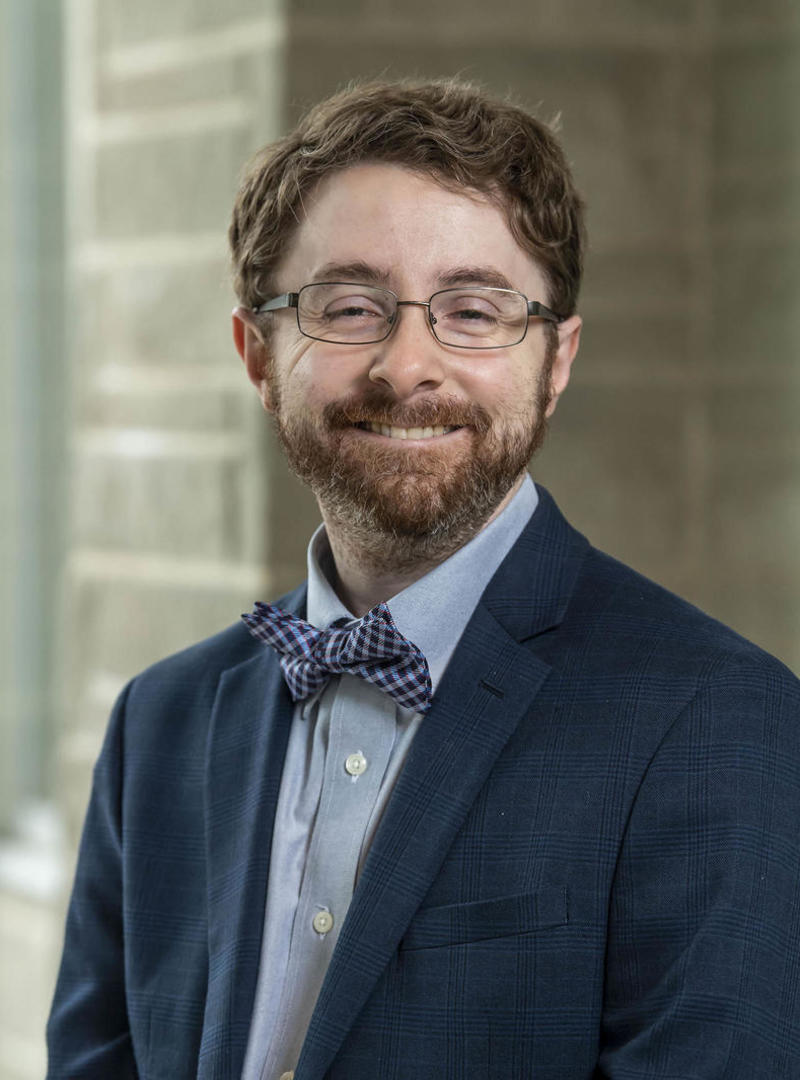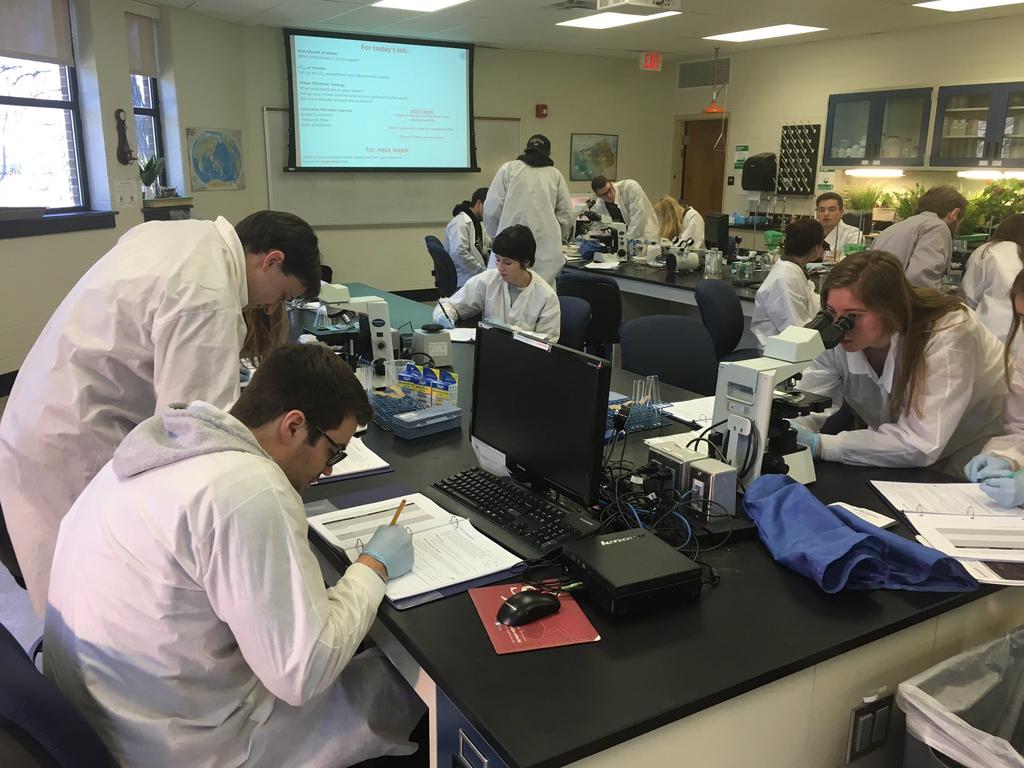
GEP Science Lab Coordinator; Chemical Hygiene Officer
Saint Joseph’s University currently offers five lab-based science courses designed specifically for non-science majors in the fields of Biology, Environmental Science, Physics, and Chemistry. Successful completion of any one of these courses will fulfill the GEP / CCC Natural Science Requirement.
These courses emphasize making precise observations about the natural world and then challenges students to ask questions about their observations. Scientific ideas are generated through reasoning.
These explanations are evaluated through testing. Students will use each of the following methods in each course: collecting accurate data through observation or measurement; interpreting graphical data; conducting controlled experiments; hypothesis testing. Using this approach, students are able to discover fundamental scientific principles and concepts. Students will be able explain and make predictions about natural phenomena. These courses also emphasize how science can be seen and performed in everyday life. Students also learn how to effectively communicate experimental results and scientific ideas to their peers.
Please follow the links on the left to learn more about our curriculum and our instructional laboratory facilities.
If you have any questions, feel free to contact:
GEP Science Lab Coordinator; Chemical Hygiene Officer
Saint Joseph’s University currently offers five lab-based natural science courses for non-science majors. Listed below are the current course offerings and affiliated faculty. Each faculty member’s name is linked to their University website and lists their teaching and research interests along with their contact information.
Each course has three fifty-minute lecture periods and a three-hour laboratory per week.
Please note that there are additional GEP / CCC lab-based science courses (BIO 101/L, CHEM 120/L, PHY 101/L, PHY 105/L), however those courses are designed for science majors.
Course Offerings:
Students in this course will learn about the scientific worldview and experience the methods of science in the context of global climate change and environmental science. Ecology, basic biology, chemistry, geology, and current events are used to examine the Earth and its changing climate. Topics include sustainability, agriculture, alternative energy, biodiversity, natural resources, populations, pollution, ecosystems and biogeochemical cycles.
Affiliated faculty for ENV 106/106L:
Students in this course will learn about the scientific worldview and experience the methods of science in the context of the life sciences. The course includes a survey of plant and animal life, an overview of bioenergetics, and selected topics in genetics and evolution.
Affiliated faculty for BIO 165/165L:
In this course, students build up the basic principles of geometrical optics, electricity, thermodynamics, and/or classical mechanics by carrying out guided experiments and interpreting their results. Mathematics, at the level of geometry and simple algebra, is introduced when and as it is needed. This course is a Laboratory /Lecture combination.
Affiliated faculty for PHY 115/115L:
Students in this course will learn about the scientific worldview and experience the methods of science in the context of the science of astronomy. Topics include the roles of observation, theory, philosophy, and technology in the development of the modern conception of the Universe. The Copernican Revolution, the birth and death of stars, our Milky Way galaxy, time, and our ancestral heritage in the cosmos will be discussed and explored.
Affiliated faculty for PHY 115/115L:
The study of chemistry as it specifically relates to food. Underlying basic chemical principles will allow the study of particular molecules found in food (carbohydrates, proteins, lipids) and the changes these molecules undergo as they are cooked and absorbed. Topics will also include preservation, food safety, and food additives. This course is only open to Food Marketing Majors.
Affiliated faculty for CHEM 112/112L:

The instructional laboratories for the GEP / CCC Lab-Based Natural Science Courses for non-science majors are housed in Connelly Hall on the James J. Maguire campus of Saint Joseph’s University.
This laboratory was built in the summer of 2010 and includes new laboratory furniture and a built in audio visual system. Currently, this room is used for our Exploring the Living World laboratories. A Leica microscope has been installed in this laboratory, which connects directly to the room’s AV system to allow students to see microscopic organisms through the classroom’s projectors. Each microscope has a camera that connects to each lab station’s computers. These computers are used to assist students in data analysis.
This laboratory was built in the summer of 2011 and includes new laboratory furniture and a built in audio visual system. Currently, this room is used for our Exploring the Earth laboratories. Light cart stations are available for students to use when growing plants as part of their ecology competition studies. Computers available in the lab are used to assist students in data analysis. Much of the data we collect in this laboratory is through the PASCO Xplorer datalogger system. The laboratory also has a collection of rocks and minerals that are used by both SJU students and elementary school students that are part of the Biology Department’s Service Learning Program.
Weather permitting, some of our experiments are carried out both in the laboratory and outside.
This laboratory was built in the summer of 2012 and includes new laboratory furniture and a built in audio visual system. Currently, this room is used for the Biology Department’s Anatomy & Physiology laboratories. An Olympus microscope has been installed in this laboratory, which connects directly to the room’s AV system to allow students to see select human tissue sections through the classroom’s projectors. Student stations include microscopes and BIO-PAC software to allow students to study various aspects of physiology, including electromyography, electroencephalography and electrocardiography. Equipment is also available for various animal dissections.

Teaching assistants that are selected will be assigned to a laboratory section (3 hrs) and will assist faculty in the teaching lab.
Current Connelly Hall Teaching Assistants /Lab Prep Assistants (Fall 2025)